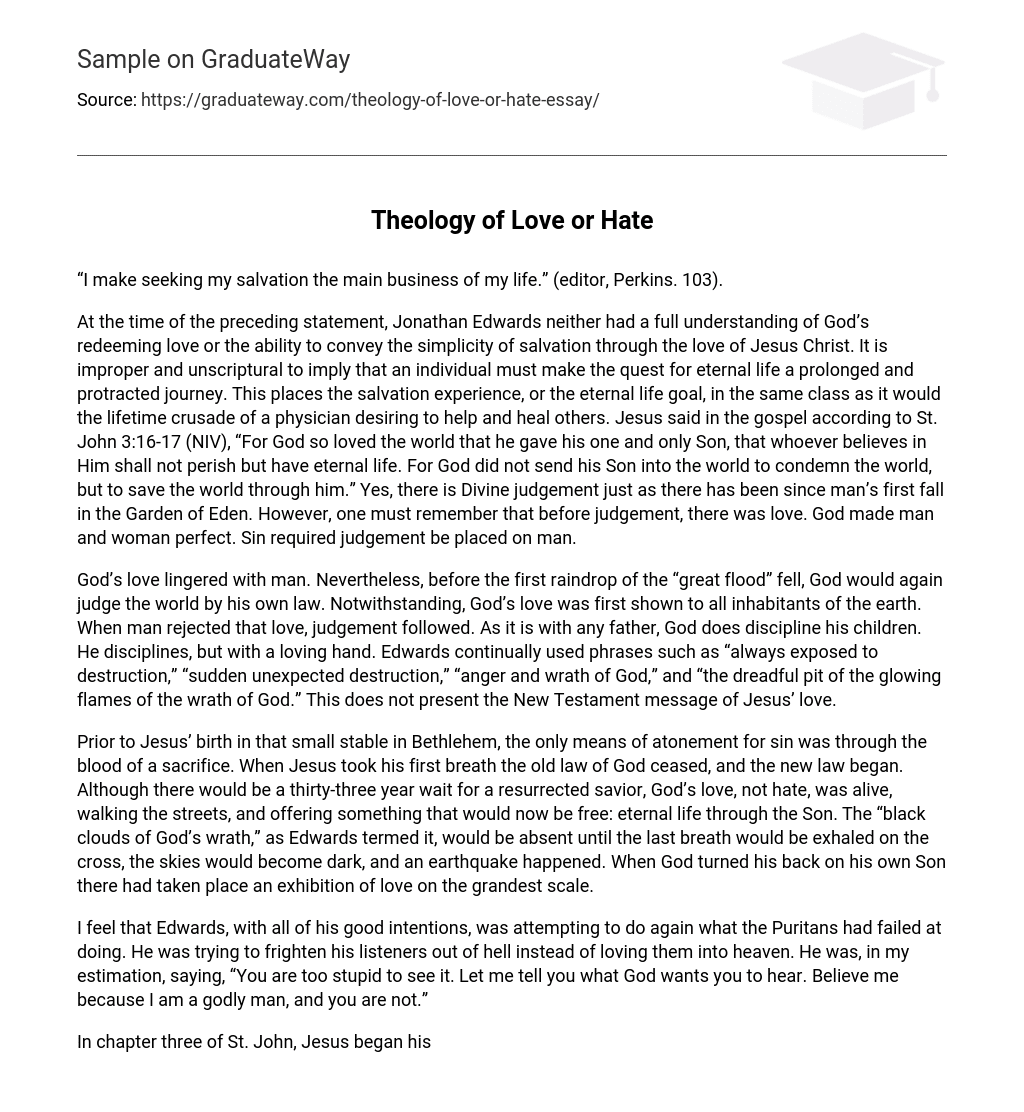Perkins (103) asserts that my ultimate goal in life is to find my salvation.
Jonathan Edwards lacked a full understanding of God’s redeeming love and struggled to explain the simplicity of salvation through Jesus Christ’s love. It is incorrect and contrary to scripture to suggest that obtaining eternal life is a difficult journey akin to a doctor’s lifelong mission of helping others. In John 3:16-17 (NIV), Jesus affirms, “For God loved the world so much that he gave his one and only Son, so that everyone who believes in him will not perish but have eternal life. God sent his Son into the world not to judge the world, but to save the world through him.” While Divine judgement exists, which has been present since humanity’s initial disobedience in Eden, we should keep in mind that love precedes judgement. Initially, God created mankind perfectly; however, sin necessitated judgement for humanity.
God’s love for humanity did not prevent him from judging the world according to his own law before the “great flood” began. Nevertheless, God initially showed his love to all people on earth. When this love was rejected by humanity, judgement ensued. In a manner akin to that of a loving father, God does discipline his children, but with a kind hand. Edwards frequently utilized phrases like “constantly at risk of destruction,” “unexpected and sudden destruction,” “the anger and wrath of God,” and “the terrifying pit of God’s fiery wrath.” This portrayal contrasts with the New Testament message of Jesus’ love.
Before Jesus was born in a small stable in Bethlehem, the only way to receive forgiveness for sin was by sacrificing animals and shedding their blood. However, with the arrival of Jesus, the old law of God ended and a new law began. It took thirty-three years for a resurrected savior to come, but during this time, God’s love was present and active on the streets instead of hatred. He offered something that became freely available: eternal life through his Son. The “black clouds of God’s wrath,” as described by Edwards, would be absent until Jesus breathed his last breath on the cross – at that moment darkness covered the sky and an earthquake occurred. In that instant, as God turned away from his own Son, a tremendous display of love took place.
In my opinion, Edwards aimed to accomplish what the Puritans couldn’t by instilling fear and anxiety about hell. Instead of gently guiding his audience towards heaven, he conveyed a condescending tone that suggested they lacked intelligence to understand God’s true desires. He positioned himself as virtuous while belittling his inferior audience.
In chapter three of St. John, Jesus began his conversation with Nicodemus by repeatedly saying “Verily, verily, I say unto you…” (John 3:3, 5, 11). The Bible’s new international version (NIV) translates this as “I tell you the truth…” “I tell you the truth…” “I tell you the truth…” These words were spoken by Jesus himself. John 3:16-17 further explains God’s love for humanity, demonstrating the kind of love that Jesus referred to when he stated in John 15:13, “Greater love hath no man than this that he lay down his life for his friends.” While a father may be willing to die for their own child, God was willing to sacrifice His Son’s life. This sacrifice was intended for those who would mistreat Him, assault Him, abuse Him and crucify Him. It required an immense amount of divine love instead of hate. Edwards failed to emphasize this aspect. The message from God has always centered around love and offering a fresh spiritual existence to those who are lost.
Edwards preached about the fierceness, anger, and fury of God towards sin and those who follow it. God’s response includes divine judgement and eternal damnation. However, it is crucial to recognize that God also demonstrates love towards individuals like Cotton Mather, William Byrd, Jonathan Edwards, and anyone who accepts it. Edwards thoroughly studied the New Testament, including the entire third chapter of the gospel of St. John. Interestingly, he appeared to focus more on discussing damnation rather than the hope offered by God. To convey his message to the world, Jesus used an example that Nicodemus would easily understand—an Old Testament story from Numbers 21:9 (KJV). In this story, the land was plagued by serpents, and those bitten faced imminent death. Moses created a brass serpent and placed it on a pole so that anyone who looked at it would be saved from death.
Jesus presented a comparison of the Father’s plan for eternal salvation, stating in St. John 3:14, “And as Moses lifted up the serpent in the wilderness, even so must the Son of man be lifted up.” While searching for Edwards’ sermon, I cannot find evidence of Jesus Christ’s love for humanity being promoted. It is possible that this love exists but is hidden beneath Edwards’ disdain for anything inconsistent with God’s ways. According to my personal beliefs, Jonathan Edwards will never truly embody a loving messenger of God. He seems to lack a complete understanding of God’s redeeming love and the ability to convey its simplicity.
Editors, Perkins. (1999). The American Tradition in Literature: Shorter Edition in One Volume. Boston: McGraw-Hill College.
Works Cited
Editors, Perkins. The American Tradition in Literature: Shorter Edition in One Volume. McGraw-Hill College. Boston. 1999).





